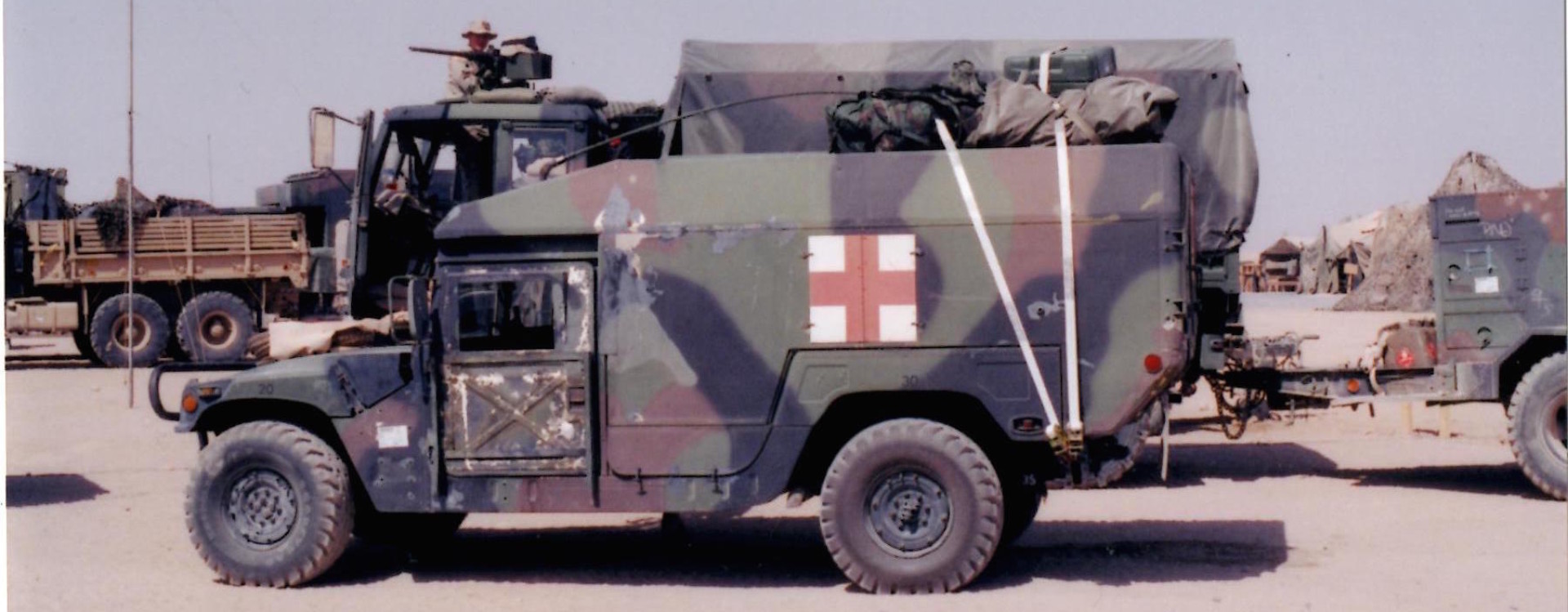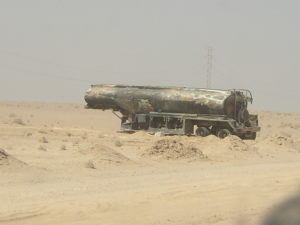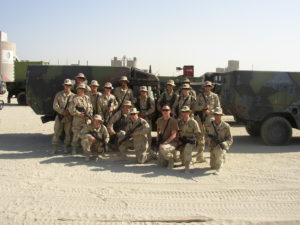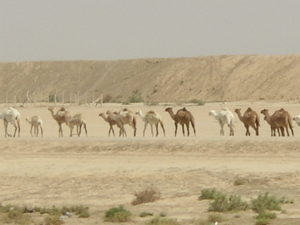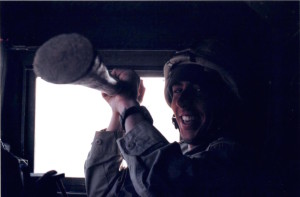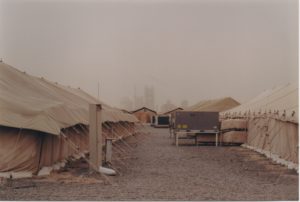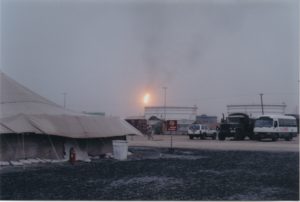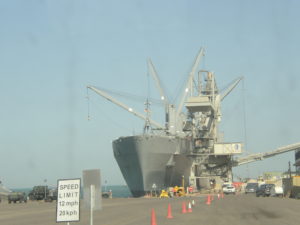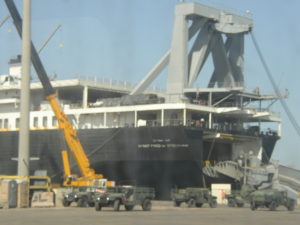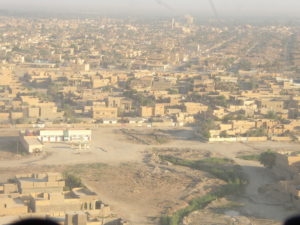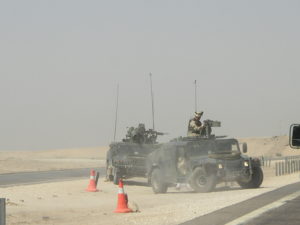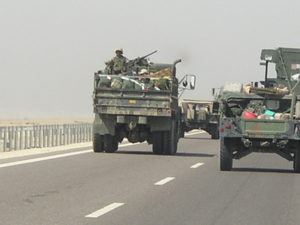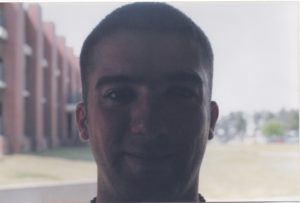Pack your bags
Finally it came time to go home.
After nearly nine months in the desert, we packed our bags, loaded our trucks, said goodbye to the marine unit replacing us and drove out the gates of al-Taqqadum air base for one last time.
My last action as a medic in Iraq came in those final days. While pulling a shift at the ambulance depot, we were called to attend to a group of soldiers from another unit coming on post after an incident involving an IED. As the trucks pulled up to our aid station, I ran to one and began to offload the wounded soldier in the rear. He had a small perforation wound in his right thigh, the result of a piece of shrapnel having punctured it. The muscle pushed its way out of skin in a red, round circle. It wasn’t a terrible wound, all things considered. The soldier was stable, bleeding was minimal and he was dealing with any pain in a calm and stoic manner. His lieutenant shouted and swore as we tended to the wound. In the emotionally deadened state that comes with spending too long in a dangerous place, we grumbled to each other, wishing the lieutenant would shut the fuck up and get himself together. The wound was no big deal, no lives were lost. It was a good day all around. I couldn’t appreciate then, the extremes of emotion that a commander feels when the lives of his or her soldiers are put in jeopardy.
A year or so later, I would spend four months on assignment with an infantry unit, serving under a staff sergeant, whose soldiers were killed by an IED in Iraq. He drank frequently to extremes and during some of these sessions he would come to a full stop, stare into the distance and say “I made the roster that day. I sent them to die.” This could be followed by violence, or by tears. Or by a catatonic silence. There was no telling.
But that hasn’t happened yet in this story.
The day came for our final convoy through Mesopotamia. Dustan and I checked our gear one last time, loaded our ambulance and mounted up for the drive. Our convoy commander on this occasion was a young 2nd lieutenant (like a private, but an officer) who had yet to command a convoy. Several officers were in the same situation and our unit wanted to make sure that every officer commanded at least one convoy during the deployment, as this made them eligible for one of the Army’s awards. The more decorated officers a unit could count in its ranks, the better that unit looked on the parade field next to other units. Because these last convoys would be considerably larger than the ones that we usually ran and each one would be just one of a group of convoys making up an entire battalion, the support was deemed strong enough and the risk low enough that each could be commanded by a newbie.
Thankfully, the convoy was uneventful, but our new commander did make one decision that annoyed those of us, who had been convoying across the country for the past half year. On the second day, he ordered us off the main highway and onto an older, more disused highway. This was the way that we had come up through Iraq from Kuwait initially and we knew that it would add many hours to our route. In our pre-convoy briefing, we had been told that intel had declared the length of the main highway to be clear for passage. Maybe the situation had changed, or maybe the lieutenant wanted to go the longer, harder way for bragging rights. Maybe he was just an idiot. Lacking any more information, our imaginations were left to fill in the gaps in our knowledge.
The drive was long. Time stretched out across an unchanging horizon and we each fought to remain alert. It was a losing battle. At some point long into the drive, I started to hear something. The sounds made no sense, but they kept being repeated. Then something heavy and dense struck my helmet. I had fallen asleep at the wheel and Dustan had awoken me with the butt of our vehicle’s pickaxe handle, shouting “Brake lights, Forest, brake lights!” over and over. We avoided rear-ending the truck in front of us by only millimeters.
The convoy had slowed because we had reached the end of the miserable, pot-holed old highway and were turning (back) onto the newer, better maintained one. It meant that we were almost to Kuwait. We switched drivers and chewed through the last miles of oilfields dotted with their apocalyptically burning towers before crossing the border back into Kuwait.
The Enemy Within
We met our real enemy at Camp Arifjan, near the port of Kuwait City: US Air Force inspectors. Their duty was to make sure that no potentially invasive species of any sort caught a ride to the United States on any part of our vehicles. Before that miserable night spent cleaning, re-cleaning and re-cleaning our vehicles again, we had no idea that any single vehicle could have so many parts, too many of which appeared to be only visible to our tormentors, the inspectors. We power washed, scrubbed and probed every surface, nook and cranny of our vehicles. The first wash alone took over an hour. When we were satisfied, we hailed an inspector, who promptly stuck a white-gloved finger into a hidden recess of our truck, showed us the offending smear of dirt and walked wordlessly away.
By the time we were finally cleared, we were tired, angry, borderline mutinous, soaking wet from all the pressure washing and I had blisters on my heels from the hours spent in damp boots. We caught a couple hours of rack time (sleep, in civilian English) before being called to the next task: loading our vehicles onto the transport vessel that would bring them home.
Trucks in Tight Spaces
Here, we learned that not being in a combat zone did not mean that we were out of danger.
We lined up our vehicles at the port and began the slow task of driving them into the belly of the ship, wherein other soldiers guided each of us to a set of tie-downs, to which our trucks would be secured for the voyage. It was slow going, LA-style stop-and-go traffic at its worst. Fortunately, I had thought ahead to bring a book to read while idling and waiting to be motioned forward. Some time well into this process, I drifted off to the sounds of a song playing on my car radio. I was shaken roughly awake by a fellow soldier, who was shouting at me to dismount and get to the top deck. Are we done? I asked him. The radio was no longer playing, which annoyed me. I didn’t remember turning it off. Stay awake and get on deck! the soldier shouted again. I waved at him, mumbled something and tried to catch the dream that I had been having. Had I just been driving my car somewhere lush and green? Wake up!! he screamed at me again, tearing me by the arm both from my reverie and from my truck seat. Get on deck now!! Are we done? I asked him again.
I finally did stumble my way to the top deck, shuffling disjointedly in step with the other soldiers from my battalion. When I came up top and felt the wind across my face, my eyes and throat began to slightly burn and my head to slightly clear. Had I just been listening to a song on the radio? Impossible, as the only radio in my ambulance was for talking to other people. As we stumbled down the gangway to the dock, other medics stood by to check us out. As our heads continued to clear, they explained that we had been found passed out, slowly suffocating from carbon monoxide poisoning from our vehicles idling in the still below-deck air. Perhaps we had been so distracted by thoughts of going home that we had overlooked some very basic things about running engines in enclosed spaces. All joking about the Air Force inspectors aside, this made bacteria and exhaust our two most dangerous enemies over the course of our deployment. We took a break to catch our breathe, then continued on with the task, a little bit wiser and more wary than before. With the trucks finally loaded on the ship, we loaded ourselves onto an airplane and left the desert behind, a tan smear across the earth below us, quickly giving way to the green land and bright city lights of Europe.
Welcome to Hell
Over the course of our time in the desert, we had a running joke about Hell being a bar that was never closed, but always out of any drink you want. Another common reference to Hell was to tell someone to go there, to which the stock reply was “I’ll save you a seat at the bar.” At our layover in Frankfurt, we found ourselves in Hell. We had a couple, maybe three hours to kill and a small part of one airport wing was sectioned off for us. We were not allowed to go beyond its confines and no civilians were allowed in. The one shop in our cordoned section was a cafe/bar. We were ordered not to order any alcohol. Rick, Dustan and I, along with several others from Ambulance Platoon sat at the bar for want of anything better to do. We ordered juice or something equally unsatisfying, while trying not to stare to hard at the tap handles behind the bartender. Well boys, Rick said, welcome to Hell. Thanks for saving me a seat.
Anticlimax
Without a family to greet at Ft. Bragg, landing back in the States was a bit of an anticlimax. We disembarked the plane, stood in formation for a few quick comments by unit commanders and got ferried back to the barracks. I can’t really remember what Rick and I, who shared a barracks room, did when we first stepped inside it. Probably dozed off for a while. Maybe watched TV. Who knows.
The entire battalion was due for two weeks of block leave, starting a week after our return. That first week back was one of constant briefings. They were called “reintegration” briefings, meant to prepare us for a return to life outside a combat zone. Many of them were given by chaplains and psychiatrists, who warned us to watch our emotions and to guard against outbursts of anger and violence, to get help when needed. Even given our relatively uneventful deployment, it was hard to listen to these briefings seriously. I think I can speak for most of us, in saying that we just sat through them, eyes vacantly fixed on the speaker, but minds active in imagining what would happen while on leave.
The end of that long, dull week finally arrived and once again, we boarded airplanes, this time scattering each to our own destination.
Back home in Juneau, I enjoyed the company of friends and family, rock climbing on sea cliffs and food that I hadn’t tasted in a long time. Then I scared my sister when I pulled a perfectly normal combat driving maneuver to make a sharp left-hand turn through an intersection. Fuckers didn’t expect that move. Which fuckers? Damn, sorry…I forgot…no one here is gunning for us. Even an uneventful deployment leaves you seeing movement in the shadows.
